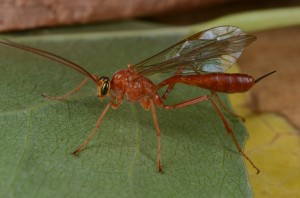CSUN Series to Explore the Benefits Bugs Bring to the Garden

A female parasitoid wasp, Ophion. She will lay an egg in the immature stages of other insects, such as moths or beetles. Photo courtesy of Jim Hogue.
The average home garden harbors many insects, spiders, centipedes and other multi-legged creatures, often to the horror of their human observers.
Enlightened gardeners know that many of these fearsome creatures help maintain a healthy yard by preying upon plant-eating pests. The summer installment of California State University, Northridge’s CSUN-al Gardening Series, “Insect Friends with Benefits,” will focus on who these multi-legged warriors are, how to welcome them into a home garden and how to enlist them in the battle against garden pests.
CSUN entomologist Jim Hogue, curator of the Department of Biology’s herbarium, vertebrate and insect collections, will demonstrate on Saturday, Aug. 16, how to recognize and encourage beneficial insects and other multi-legged predators into the garden. His lecture will take place from 9 to 10:45 a.m. at the university.
“There are many insects and other arthropods that are helpful to the home gardener,” said Brenda Kanno, manager of CSUN’s Botanic Garden, which hosts the gardening series. “They assist in reducing the numbers of plant-eating and plant-sucking pests, without the use of harsh pesticides. It’s like inviting volunteers on a seek-and-destroy mission in to your garden.”
Registration for the free class is required. Email botanicgarden@csun.edu to request a space in the class or for more information. Driving and parking instructions, as well as the class meeting location, will be sent upon registration.
California State University, Northridge’s Botanic Garden is operated by CSUN’s Department of Biology, and serves as a field site for botany, entomology, photography, painting and other classes. In addition to outdoor landscapes and natural botanic environments, the garden features greenhouses where noteworthy botanical specimens are grown. The garden is open to the community. Visit the website www.csun.edu/botanicgarden/ for more information.

 experience
experience